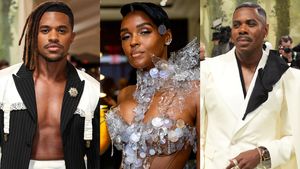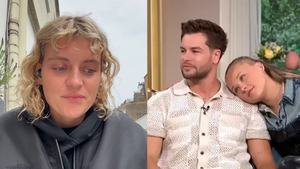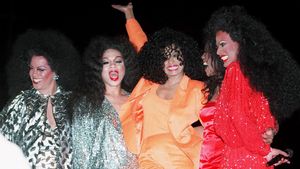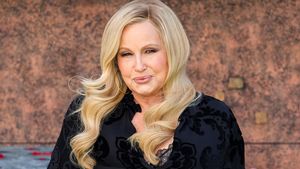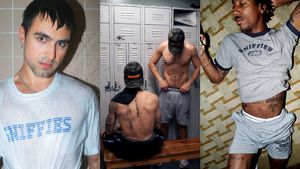On the most recent episode of America's Got Talent, 84-year-old Ray Jessel made his way to the stage to sing an original song. Jessel, who says he began performing only 12 years ago, sat behind a piano and sang a song the judges simply loved.
The song features the well-worn theme of unrequited love. That, mixed with dick jokes.
"She's got a penis," Jessel sings.
Host Nick Cannon sure seemed to love it.
It's like the music video for Carly Rae Jepsen's "Call Me Maybe," in which it turns out at the very end that the guy poor little Carly Rae wants to call her turns out to be gay. How embarassing. Well, actually, it's not exactly like that. It would be if the song ended like, "Hey, I just met you / And this is crazy / But it turns out that you like to have dudes do you in the ass and ew, ew, ew, ew, ew, that is like so-o-o gross / Don't call me ever!"
That's basically what Jessel is doing here. Totally hilarious, right? "A breath of fresh air," judge Howard Stern calls it, and I agree! I mean, yes, it's the same exact joke that's been used in everything from Ace Ventura to It's Always Sunny in Philadelphia to How I Met Your Mother to 30 Rock to The Daily Show, but when an 84-year-old man does it, *muah* pure comedic art.
Oh, and suppose I should mention that this type of "joke" has also doubled as a legal defense in murder trials, but that's funny too, right? I mean, just ask any of the murder victims whose killers have used the "trans panic" defense. Ah, right, sorry, You can't, because they're dead. The reason? Well, like Jessel sings to roaring laughter, "she has a penis." Or, I suppose, in their cases, "had" would be more appropriate, but you get the idea.
Hilarious.
Really, give it up to that guy. A true comic genius. I've been chuckling the entire time I've been writing this. To be fair, though, I suppose I should check in with someone who didn't find this roaringly hilarious joke that's been made dozens of times before and used as an excuse to murder people as funny as I did.
And so I spoke with trans activist Kat Hache.
Absolutely perplexed, I asked Hache what could possibly be offensive about this song.
"The song reinforces the idea that being with trans women and even just being a trans woman is shameful and disgusting,and wrong," Hache informs me. "It makes simply being transgender the punchline of the song. Like a lot of transphobic humor in our culture, the message is that the mere existence of trans people is something worth laughing at, when the lived reality of being a trans person is often a reality shaped by violence from daily microaggressions and negations of our identities to larger acts of overt physical violence against trans people. The trickster myth, i.e. that trans women trick their partners into being attracted to them and hide their genital configuration -- which is assumed to be in the public domain -- is a dangerous one, and it has been used to justify violence against trans women. Songs like this both reinforce the idea that trans women deceive others by expressing themselves as they want to be perceived and keep trans women from ever feeling safe enough to actually start transitioning, as those who do are painted as objects of ridicule and deceptive."
Well, I suppose that's one way to look at things.
But clearly, NBC had a responsibility to show every single performance by every single performer to make their way to the stage, right? I mean, it's not as though tens of thousands of people audition for the show or anything, and the network just chooses which performances it wants, right?
Oh, wait. You mean to tell me that NBC made a conscious choice to air this? Smart execs over at that network, I tell you. Smart execs. That's why they've done so well in the ratings these past years.
"I don't think that they [had an obligation to air this performance]," Hache tells me. "I would assume that they are fully within their power to decide that any performance is unacceptable for the platform that they provide, and I have a hard time believing that had he performed a racist, or even homophobic song, that it would have been allowed to air, and if it had, I doubt that it would have received the same sort of positive reaction. By giving transphobia a prime-time platform, not only are they saying that one individual transphobic performance is acceptable, but they are encouraging similar 'jokes' elsewhere on television by normalizing it."
I suppose that's true. Best I can tell, the show hasn't run any overtly homophobic or racist humor this season. Then again, maybe it has. I only found out about this from all my self-described "trans ally" friends who thought this particular performance was hilarious and found it over at The Daily Dot.
Again, Hache plays the role of total buzzkill, telling me it's not funny to laugh at the plight of others. Ugh.
"Humor is going to be subjective, always, but personally, I find it hard to imagine that someone who identifies as an ally could find jokes and songs like that funny if they are at all mindful of how they are perceived by trans people and how the messages that they convey are harmful," she says. "Toxic beliefs are still toxic even if they are wrapped up in a catchy tune."
Well, before I go and watch that kooky old man sing the funny song about how ladies with penises (penii?) are just the funniest thing since "Who's on First" again, I suppose I should give Hache the final word.
"I'm very disappointed to see this type of humor not only accepted on prime-time television, but celebrated," she tells me. "It's something that I would have expected more 10 or even 20 years ago, but we are in an age where transgender people are visible and making their voices heard. Surely Nick Cannon and the judges fawning over the performance have heard of Laverne Cox. Surely the audience understands that transgender people exist and are every bit as human as they are. Even so, this type of humor is seen as acceptable, and public figures who should be mindful of their platform are encouraging it because they don't think of how a trans person watching that performance would perceive it. The message that that song sent to every transgender person tuning in -- trans youth included -- was that they are shameful and disgusting and that people will celebrate them being made fun of. I expect better from networks and public figures, especially in the year 2014, and I hope that going forward they will be more mindful of the kind of content and the ideas that they are promoting about marginalized groups."
PARKER MARIE MOLLOY is the founder ofPark That Carand works as a freelance writer. She has contributed writing toRolling Stone, Salon, The Huffington Post,Talking Points Memo,andThe New York Timesas well asThe Advocate.Follow her on Twitter @ParkerMolloy.

























